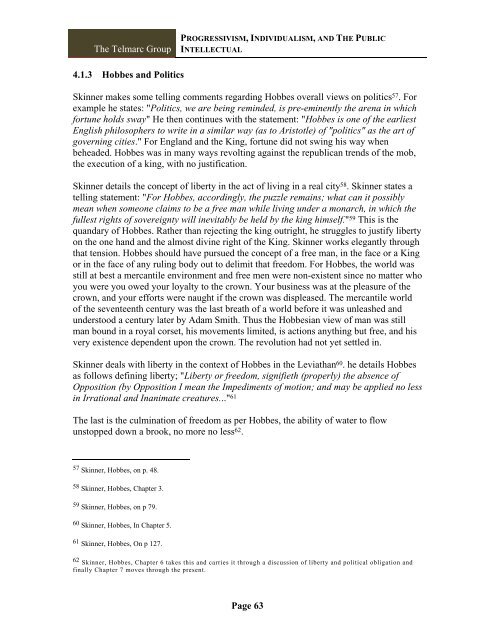progressivism, individualism, and the public ... - Telmarc Group
progressivism, individualism, and the public ... - Telmarc Group
progressivism, individualism, and the public ... - Telmarc Group
Create successful ePaper yourself
Turn your PDF publications into a flip-book with our unique Google optimized e-Paper software.
The <strong>Telmarc</strong> <strong>Group</strong><br />
4.1.3 Hobbes <strong>and</strong> Politics<br />
PROGRESSIVISM, INDIVIDUALISM, AND THE PUBLIC<br />
INTELLECTUAL<br />
Skinner makes some telling comments regarding Hobbes overall views on politics 57 . For<br />
example he states: "Politics, we are being reminded, is pre-eminently <strong>the</strong> arena in which<br />
fortune holds sway" He <strong>the</strong>n continues with <strong>the</strong> statement: "Hobbes is one of <strong>the</strong> earliest<br />
English philosophers to write in a similar way (as to Aristotle) of "politics" as <strong>the</strong> art of<br />
governing cities." For Engl<strong>and</strong> <strong>and</strong> <strong>the</strong> King, fortune did not swing his way when<br />
beheaded. Hobbes was in many ways revolting against <strong>the</strong> re<strong>public</strong>an trends of <strong>the</strong> mob,<br />
<strong>the</strong> execution of a king, with no justification.<br />
Skinner details <strong>the</strong> concept of liberty in <strong>the</strong> act of living in a real city 58 . Skinner states a<br />
telling statement: "For Hobbes, accordingly, <strong>the</strong> puzzle remains; what can it possibly<br />
mean when someone claims to be a free man while living under a monarch, in which <strong>the</strong><br />
fullest rights of sovereignty will inevitably be held by <strong>the</strong> king himself." 59 This is <strong>the</strong><br />
qu<strong>and</strong>ary of Hobbes. Ra<strong>the</strong>r than rejecting <strong>the</strong> king outright, he struggles to justify liberty<br />
on <strong>the</strong> one h<strong>and</strong> <strong>and</strong> <strong>the</strong> almost divine right of <strong>the</strong> King. Skinner works elegantly through<br />
that tension. Hobbes should have pursued <strong>the</strong> concept of a free man, in <strong>the</strong> face or a King<br />
or in <strong>the</strong> face of any ruling body out to delimit that freedom. For Hobbes, <strong>the</strong> world was<br />
still at best a mercantile environment <strong>and</strong> free men were non-existent since no matter who<br />
you were you owed your loyalty to <strong>the</strong> crown. Your business was at <strong>the</strong> pleasure of <strong>the</strong><br />
crown, <strong>and</strong> your efforts were naught if <strong>the</strong> crown was displeased. The mercantile world<br />
of <strong>the</strong> seventeenth century was <strong>the</strong> last breath of a world before it was unleashed <strong>and</strong><br />
understood a century later by Adam Smith. Thus <strong>the</strong> Hobbesian view of man was still<br />
man bound in a royal corset, his movements limited, is actions anything but free, <strong>and</strong> his<br />
very existence dependent upon <strong>the</strong> crown. The revolution had not yet settled in.<br />
Skinner deals with liberty in <strong>the</strong> context of Hobbes in <strong>the</strong> Leviathan 60 . he details Hobbes<br />
as follows defining liberty; "Liberty or freedom, signifieth (properly) <strong>the</strong> absence of<br />
Opposition (by Opposition I mean <strong>the</strong> Impediments of motion; <strong>and</strong> may be applied no less<br />
in Irrational <strong>and</strong> Inanimate creatures..." 61<br />
The last is <strong>the</strong> culmination of freedom as per Hobbes, <strong>the</strong> ability of water to flow<br />
unstopped down a brook, no more no less 62.<br />
57 Skinner, Hobbes, on p. 48.<br />
58 Skinner, Hobbes, Chapter 3.<br />
59 Skinner, Hobbes, on p 79.<br />
60 Skinner, Hobbes, In Chapter 5.<br />
61 Skinner, Hobbes, On p 127.<br />
62 Skinner, Hobbes, Chapter 6 takes this <strong>and</strong> carries it through a discussion of liberty <strong>and</strong> political obligation <strong>and</strong><br />
finally Chapter 7 moves through <strong>the</strong> present.<br />
Page 63












